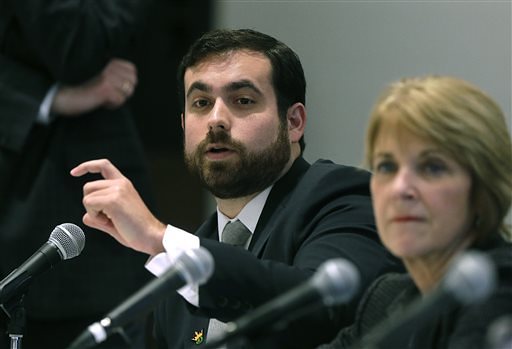Fantasy sports betting eyed by Gaming Commission
By NBP Staff | December 10, 2015, 21:32 EST
 Zakary Cutler, left, director of product management for Boston’s DraftKings, addresses the Massachusetts Gaming Commission as former state Attorney General Martha Coakley, right, now serving as legal counsel to DraftKings, looks on Thursday. (AP Photo/Steven Senne)
Zakary Cutler, left, director of product management for Boston’s DraftKings, addresses the Massachusetts Gaming Commission as former state Attorney General Martha Coakley, right, now serving as legal counsel to DraftKings, looks on Thursday. (AP Photo/Steven Senne) BOSTON – Daily fantasy sports companies DraftKings and FanDuel voiced support Thursday for Massachusetts’ approach to regulating their controversial industry as states across the country weigh greater restrictions or outright bans on the games played for money.
Speaking before the Massachusetts Gaming Commission, Zakary Cutler, director of product management for Boston’s DraftKings, said regulations proposed by state Attorney General Maura Healey appear “reasonable” and “pretty thorough.” Stephen Martino, a lawyer for New York’s FanDuel, echoed that sentiment, suggesting Massachusetts’s approach could be a template for other states to follow.
“They’re a good starting point,” he said of Healey’s proposal. “There’s a real commitment that’s come from the very top of FanDuel to see the right thing done.”
The Gaming Commission devoted Thursday to the burgeoning market dominated by Boston-based DraftKings and FanDuel, whose sites let bettors enter multiple contests each season to wager on “teams” they pick. The performance of each fantasy team relies on the real-world accomplishments of actual players, who are represented on the rosters of the fantasy teams.
Healey has proposed regulations that would require daily fantasy sports players to be at least 21 years of age, prohibit college sports from the competitions, require stronger player data protections and programs to help problem gamblers, among other requirements.
“What we heard today is that they need to know the rules of the road,” Gaming Commission Chairman Stephen Crosby said, following remarks from DraftKings and FanDuel representatives. “So as long as the rules are, in their terms, commercially viable and technologically feasible, they will welcome them. That seems like a perfectly reasonable starting point.”
At the heart of the issue is whether the games are a form of gambling or sports betting and should be banned or treated like other forms of gambling. Fantasy sports companies contend a provision in the 2006 federal law that banned online gambling allows them to operate freely in 45 states that don’t have specific prohibitions on the contests.
“We firmly believe this is a game of skill that’s legal in Massachusetts and should be subject to reasonable regulations,” former state Attorney General Martha Coakley, who now serving as legal counsel to DraftKings, said Thursday.
No votes or decisions were expected from the daylong hearing, which included discussion from a range of industry watchers.
An industry lawyer said that licensing and authorizing pay-to-play daily fantasy sports could run afoul of federal law, though whether that would be enforced is an open question.
Several states are in the process of coming up with laws and regulations to govern the operations of sites like DraftKings, according to USA Today. It cited California as one, noting that a bill there would subject the industry to oversight of the same agency that oversees casinos. Other states, such as Nevada and New York, have sought to ban the sites as illegal online gaming businesses.
Daniel Wallach, a lawyer with Becker & Poliakoff who said he does not currently work for fantasy sports companies, cautioned that the tack taken by Florida and California strays “over the line because of the licensing apparatus.”
“One thing a state cannot do is license a sports-gambling, sports-wagering scheme,” Wallach told the State House News Service.
Citing the Professional and Amateur Sports Protection Act, Wallach said states can decriminalize and regulate daily fantasy sports but “cannot authorize or license it.”
Crosby, who said the commission would issue a study on the subject for the benefit of lawmakers, wondered about the possibility of the Legislature crafting an omnibus online-gaming bill.
“Would it make sense for the Legislature to try to craft an omnibus regulatory bill for all of these new electronic gaming technologies – because there’s so many of them?” Crosby asked reporters. “If they could craft a bill, which incorporated regulatory priorities, fundamental values, whatever, that could be applied to all of these games.”










